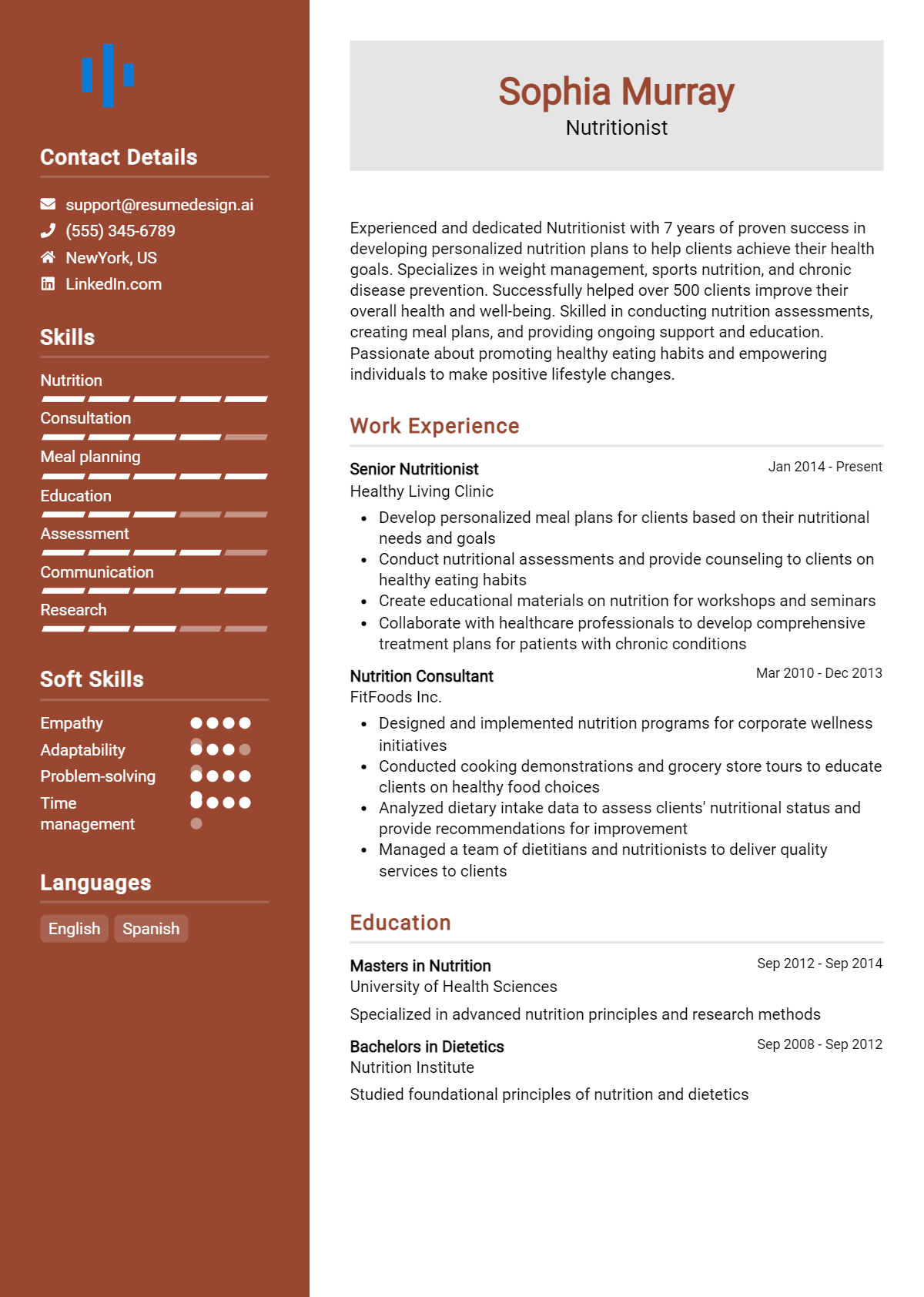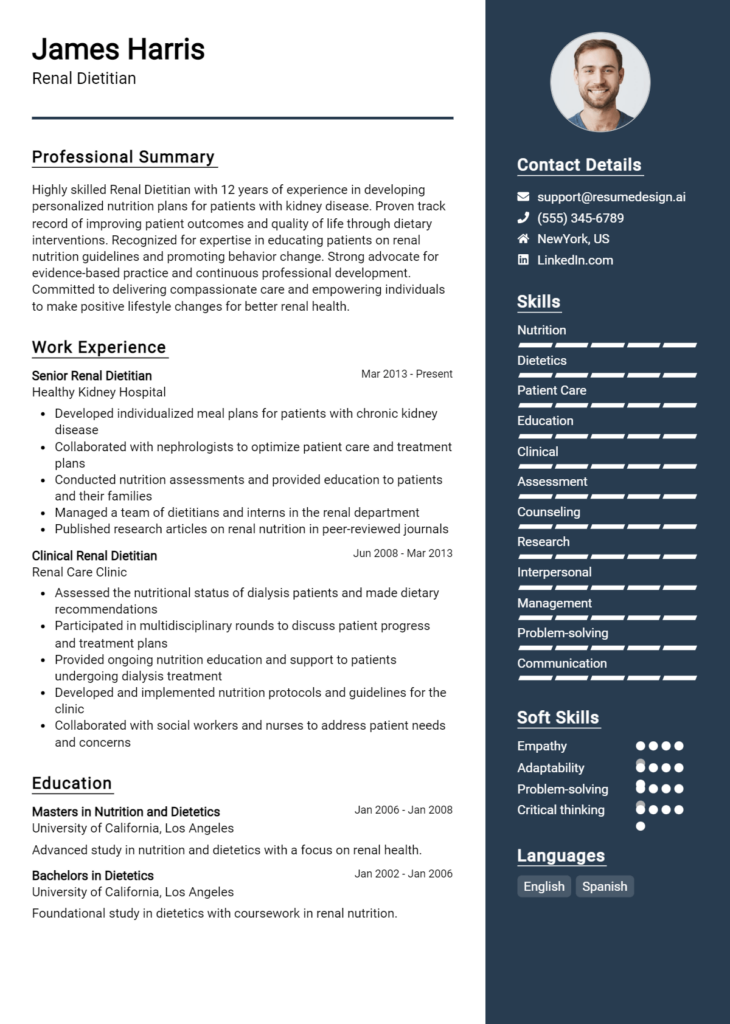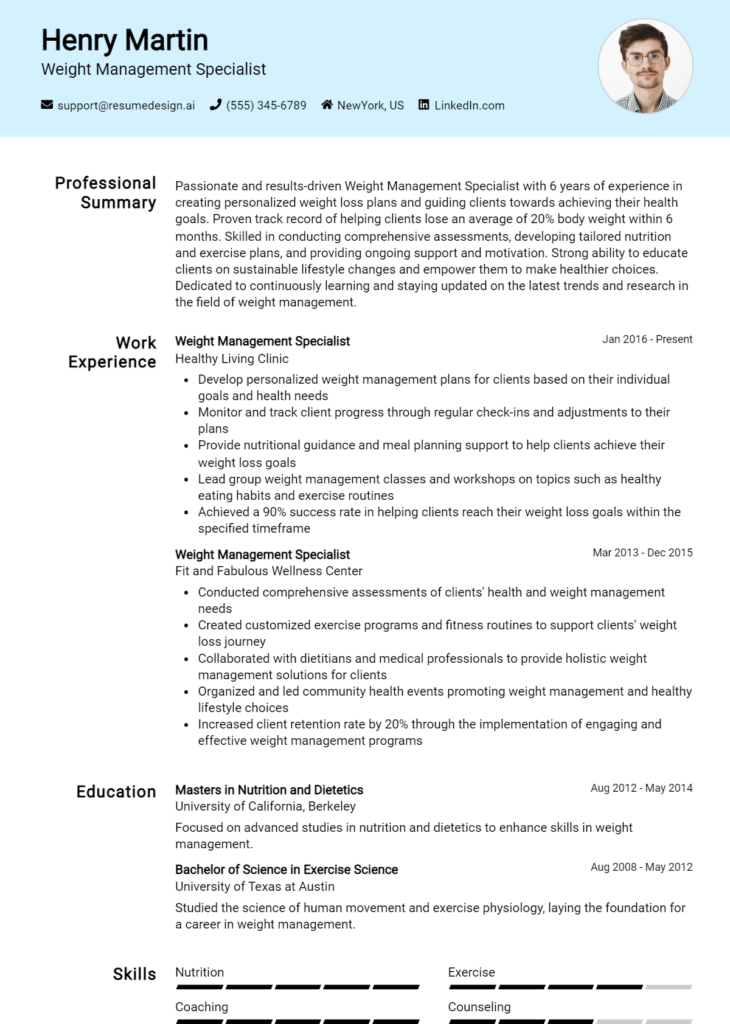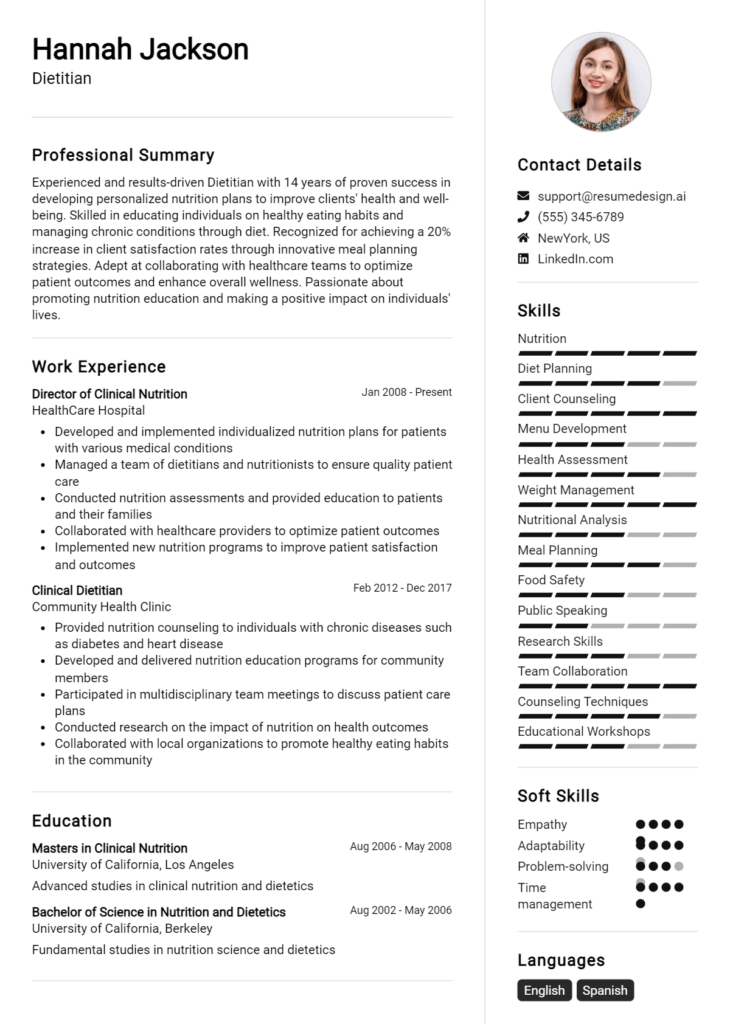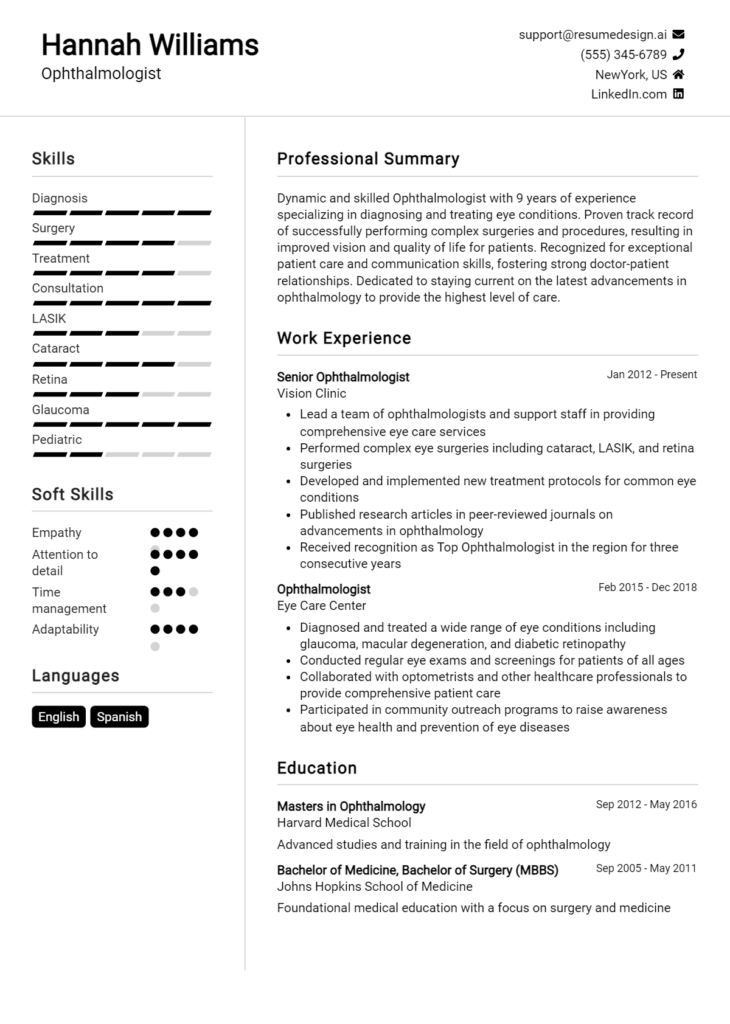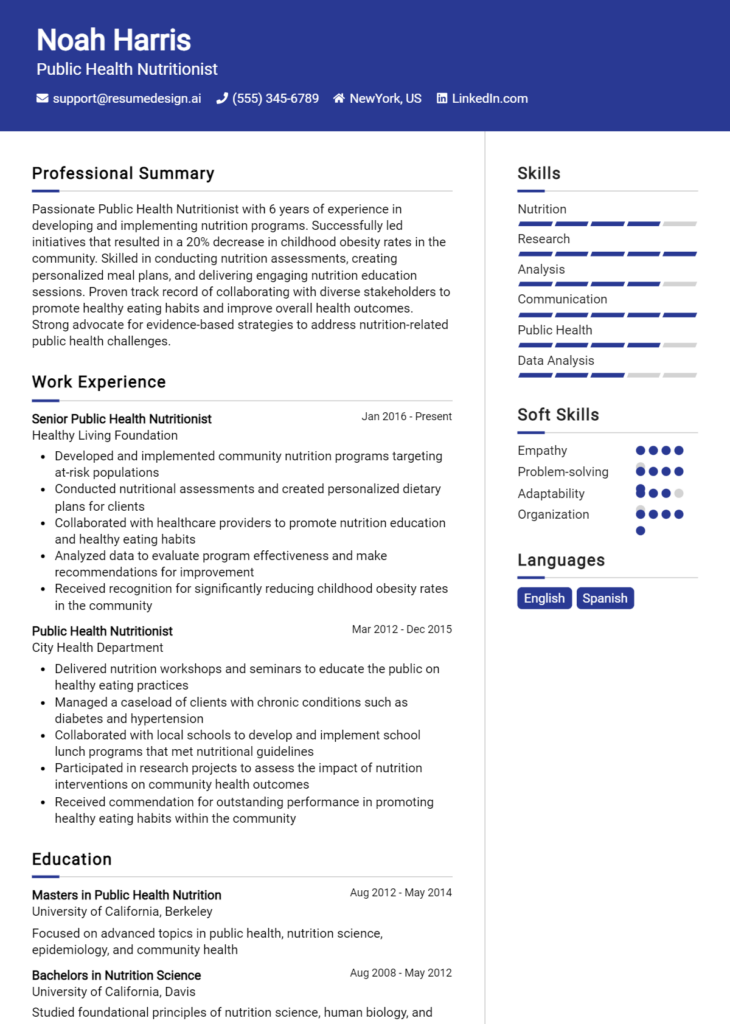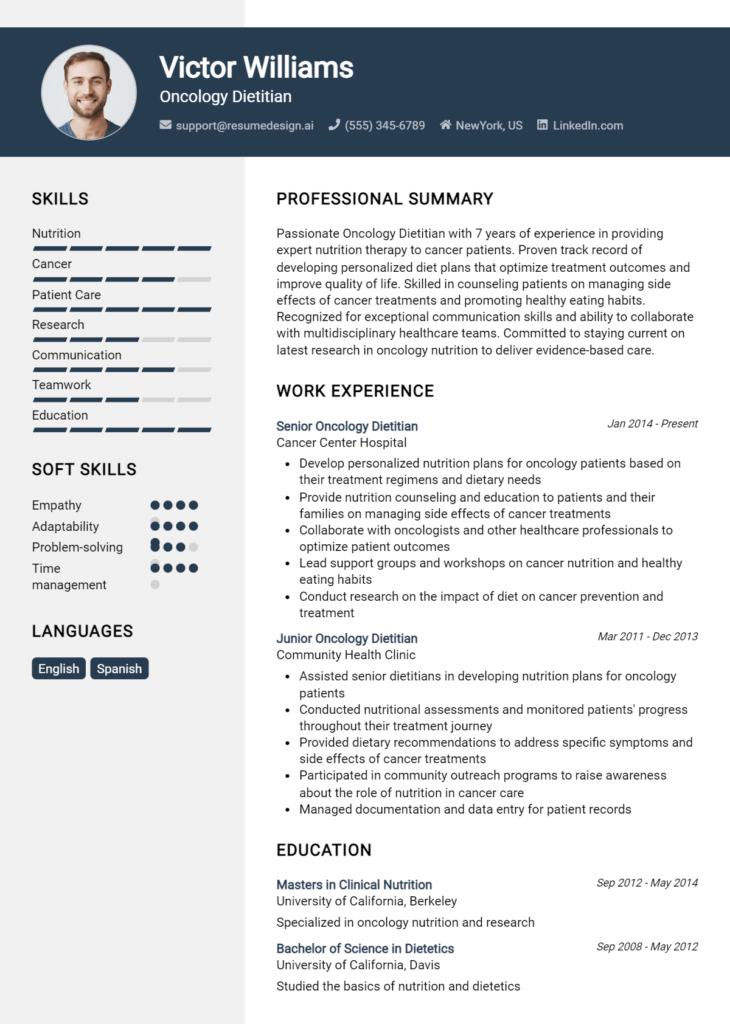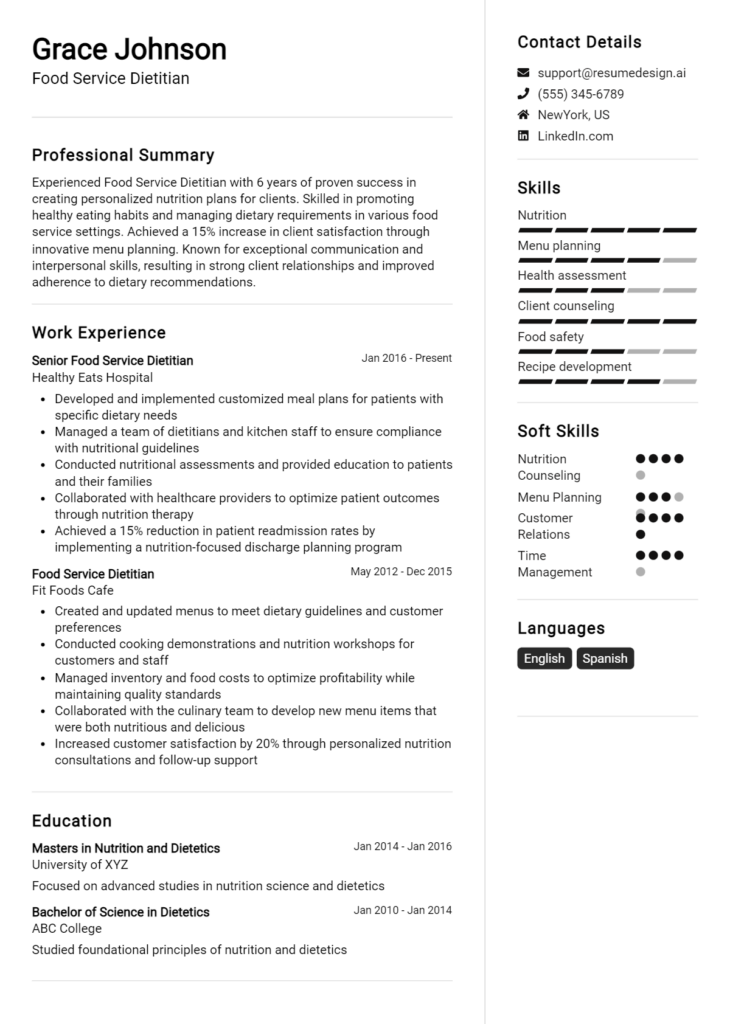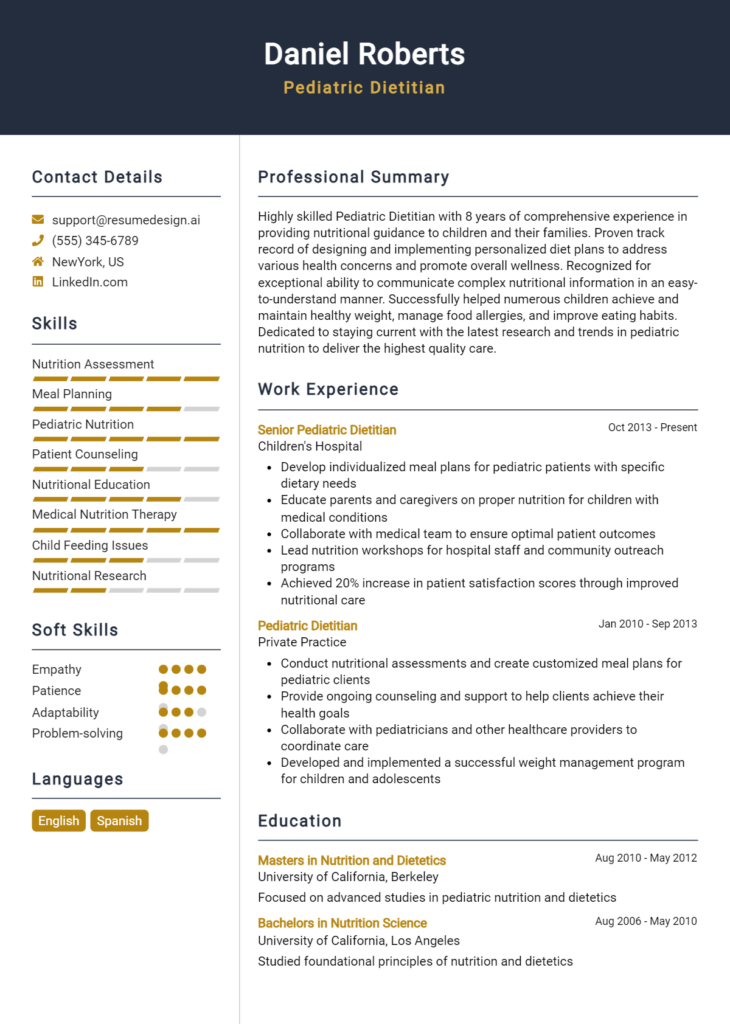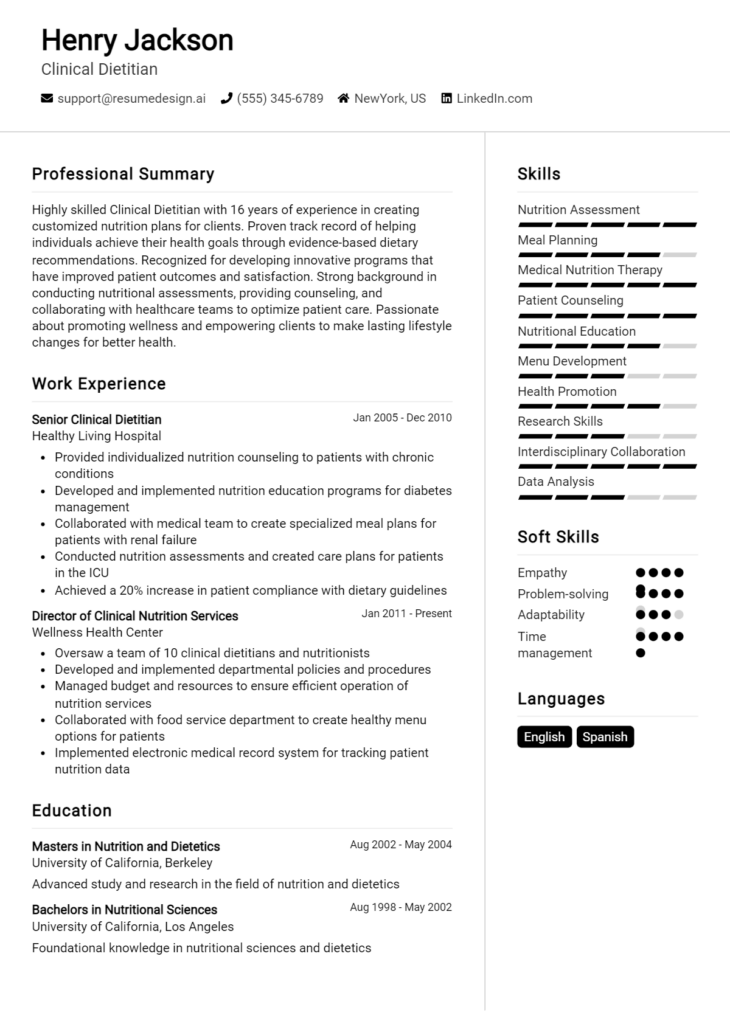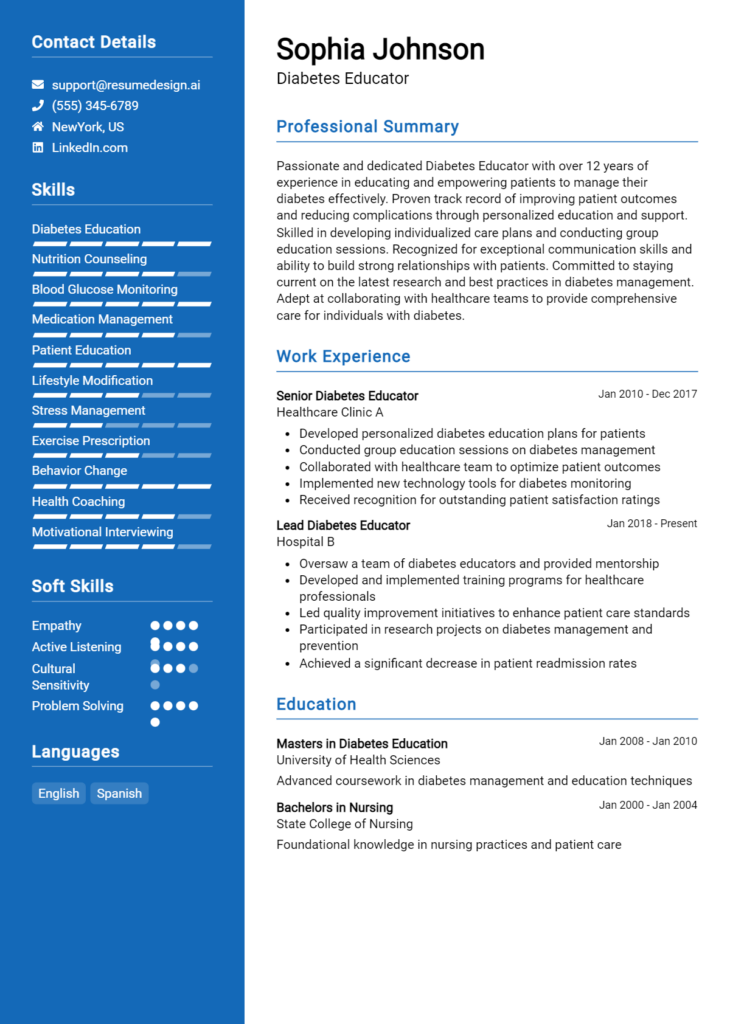Nutritionist Core Responsibilities
A Nutritionist plays a crucial role in promoting health and well-being by designing personalized nutrition plans, assessing dietary needs, and educating clients about healthy eating habits. Essential skills include strong analytical abilities, effective communication, and problem-solving aptitude, enabling the Nutritionist to collaborate with various departments such as healthcare, wellness programs, and food services. These competencies are vital for achieving organizational goals. A well-structured resume can effectively highlight these qualifications, showcasing the candidate's expertise and potential impact.
Common Responsibilities Listed on Nutritionist Resume
- Assess clients' nutritional and health needs.
- Develop personalized meal plans and dietary recommendations.
- Conduct nutritional workshops and seminars.
- Monitor clients' progress and adjust meal plans as needed.
- Collaborate with healthcare professionals to ensure holistic care.
- Stay updated with current nutrition research and guidelines.
- Provide nutritional counseling to individuals and groups.
- Analyze food products and menus for nutritional value.
- Advise on food safety and sanitation practices.
- Document and maintain client records accurately.
- Develop educational materials and resources on nutrition.
- Participate in community health programs and initiatives.
High-Level Resume Tips for Nutritionist Professionals
A well-crafted resume is crucial for Nutritionist professionals, as it serves as the first impression a candidate makes on a potential employer. In an industry where expertise, empathy, and communication are paramount, your resume must effectively reflect your skills and achievements. It is not just a list of qualifications; it's a marketing tool that showcases your unique attributes and experiences tailored to the nutrition field. This guide will provide practical and actionable resume tips specifically designed for Nutritionist professionals, helping you stand out in a competitive job market.
Top Resume Tips for Nutritionist Professionals
- Tailor your resume to match the job description by using relevant keywords and phrases.
- Highlight your educational background, including degrees and certifications related to nutrition.
- Showcase relevant experience, emphasizing roles that involved dietary planning, counseling, or research.
- Quantify your achievements where possible, such as the number of clients served or improvements in health outcomes.
- Include industry-specific skills, such as knowledge of dietary guidelines, food safety, and nutritional software.
- Demonstrate your ability to work collaboratively with healthcare professionals and clients.
- Incorporate volunteer work or internships that reflect your commitment to the field.
- Utilize a clean, professional format that enhances readability and highlights key information.
- Keep your resume concise, ideally one page, unless you have extensive experience.
- Proofread for errors and ensure consistency in formatting and language throughout the document.
By implementing these tips, you can significantly increase your chances of landing a job in the Nutritionist field. A polished and targeted resume not only highlights your qualifications but also demonstrates your dedication and professionalism, making you a strong candidate in the eyes of potential employers.
Why Resume Headlines & Titles are Important for Nutritionist
In the competitive field of nutrition, a well-crafted resume headline or title is crucial for standing out to hiring managers. A strong headline serves as a powerful summary of a candidate's key qualifications, allowing them to instantly capture attention in a crowded applicant pool. By distilling their skills, experience, and unique selling points into a concise, relevant phrase, nutritionists can effectively set the tone for their resume. This strategic approach not only highlights their expertise but also aligns their qualifications directly with the job being applied for, making it clear to employers why they are the ideal candidate.
Best Practices for Crafting Resume Headlines for Nutritionist
- Keep it concise: Aim for one impactful phrase that encapsulates your key strengths.
- Be specific: Use terminology relevant to the nutrition field to demonstrate your expertise.
- Highlight your unique selling points: Focus on what sets you apart from other candidates.
- Use action-oriented language: Start with strong verbs that convey confidence and capability.
- Align with the job description: Tailor the headline to reflect the specific role you are applying for.
- Incorporate measurable achievements: If applicable, mention quantifiable successes to grab attention.
- Stay professional: Ensure the tone reflects the professionalism expected in the healthcare sector.
- Avoid jargon: Keep the language clear and accessible to a broader audience, including hiring managers.
Example Resume Headlines for Nutritionist
Strong Resume Headlines
Experienced Clinical Nutritionist Specializing in Weight Management and Diabetes Care
Certified Nutrition Specialist with a Proven Track Record in Corporate Wellness Programs
Passionate Nutrition Advocate with Over 5 Years of Experience in Community Health Initiatives
Weak Resume Headlines
Nutritionist Looking for Job
Experienced Professional Seeking Opportunities in Nutrition
The strong resume headlines are effective because they clearly communicate the candidate's expertise and focus areas, making an immediate impact on hiring managers. They provide specific information, showcase relevant experience, and demonstrate the candidate's alignment with the job requirements. In contrast, the weak headlines fail to impress due to their vagueness and lack of detail, leaving hiring managers with little insight into the candidate's qualifications or unique attributes. By avoiding generic phrases, candidates can significantly improve their chances of standing out in a competitive job market.
Writing an Exceptional Nutritionist Resume Summary
A well-crafted resume summary is essential for Nutritionists as it serves as the first impression on hiring managers. This brief yet impactful section quickly captures attention by highlighting key skills, relevant experience, and notable accomplishments tailored to the specific job. A strong summary not only showcases the candidate's qualifications but also emphasizes how they can contribute to the organization’s goals, making it a vital component of a successful application. It should be concise and focused, allowing the candidate to stand out in a competitive field.
Best Practices for Writing a Nutritionist Resume Summary
- Keep it concise: Limit your summary to 2-4 sentences while ensuring it covers the essentials.
- Quantify achievements: Use numbers and specific results to illustrate your impact, such as percentage increases in client satisfaction or weight loss.
- Focus on skills: Highlight key skills relevant to the nutritionist role, such as dietary planning, nutritional assessments, and client counseling.
- Tailor your summary: Customize your summary for each job application by aligning it with the job description and required qualifications.
- Use action verbs: Start sentences with strong action verbs to convey your contributions dynamically.
- Showcase certifications: Mention relevant certifications, such as Registered Dietitian Nutritionist (RDN) or Certified Nutrition Specialist (CNS), to enhance credibility.
- Include soft skills: Highlight interpersonal skills like communication, empathy, and teamwork that are crucial in a client-focused role.
- Reflect passion for nutrition: Convey enthusiasm for promoting health and wellness, which can resonate well with potential employers.
Example Nutritionist Resume Summaries
Strong Resume Summaries
Dedicated Nutritionist with over 5 years of experience in providing evidence-based dietary guidance, resulting in a 30% improvement in client health outcomes. Expertise in creating personalized meal plans and conducting nutritional assessments to support weight management and disease prevention.
Results-oriented Registered Dietitian with a proven track record of increasing client engagement by 40% through innovative nutrition workshops and one-on-one counseling. Skilled in developing tailored nutrition programs that address individual health goals and dietary restrictions.
Compassionate Nutritionist specializing in pediatric dietary needs, with over 7 years of experience enhancing children's nutrition knowledge and promoting healthy eating habits. Successfully facilitated a school-based program that led to a 25% increase in healthy lunch participation.
Weak Resume Summaries
Nutritionist with experience in dietary planning and health. Good at working with clients to help them with their nutrition.
Dedicated professional seeking a nutritionist position. Passionate about healthy eating and nutrition.
The examples of strong resume summaries stand out due to their specificity, quantifiable achievements, and direct relevance to the nutritionist role. They effectively convey the candidate's skills and experience while highlighting measurable outcomes. In contrast, the weak summaries lack detail, fail to provide concrete accomplishments, and seem generic, making it difficult for hiring managers to gauge the candidate's true potential and suitability for the position.
Work Experience Section for Nutritionist Resume
The work experience section of a Nutritionist resume is crucial as it provides a comprehensive overview of the candidate's professional journey and expertise in the field. This section not only highlights the technical skills acquired through previous roles but also demonstrates the ability to lead teams and deliver high-quality nutritional programs or products. By quantifying achievements and aligning experience with industry standards, candidates can effectively showcase their value to potential employers, making it essential for standing out in a competitive job market.
Best Practices for Nutritionist Work Experience
- Detail specific technical skills related to nutrition, such as dietary assessment, meal planning, and nutritional counseling.
- Quantify achievements with metrics, such as percentage improvements in client health outcomes or the number of clients served.
- Highlight collaborative projects, showcasing teamwork with healthcare professionals, dietitians, and community organizations.
- Use action verbs to convey a proactive approach, such as "developed," "implemented," or "managed."
- Tailor your experience to match the job description, emphasizing relevant roles and responsibilities.
- Include continuing education or certifications that reinforce your expertise in nutrition.
- Demonstrate adaptability by mentioning experiences in various settings, such as hospitals, private practice, or community health.
- Showcase leadership experiences, such as mentoring interns or leading workshops.
Example Work Experiences for Nutritionist
Strong Experiences
- Successfully developed and implemented a community nutrition program that increased participation by 40% and improved participants’ health metrics by an average of 15% over six months.
- Led a multidisciplinary team of healthcare professionals in a clinical setting, resulting in a 30% reduction in hospital readmission rates for nutrition-related conditions.
- Created individualized meal plans for over 100 clients, achieving a 95% satisfaction rate and positive feedback on health improvements.
- Conducted workshops on nutrition education for over 200 community members, enhancing public awareness and engagement in healthy eating habits.
Weak Experiences
- Worked at a nutrition clinic where I helped clients with their diets.
- Responsible for organizing nutrition events occasionally.
- Assisted in meal planning and other tasks.
- Participated in team meetings to discuss nutrition topics.
The examples provided are considered strong because they include specific, quantifiable outcomes that demonstrate the candidate's impact and expertise in the field of nutrition. They illustrate leadership, initiative, and collaboration, which are essential traits for a successful Nutritionist. Conversely, the weak experiences lack detail and measurable achievements, making them vague and unimpressive. They do not effectively convey the candidate's capabilities or contributions, which could hinder their chances in a competitive job market.
Education and Certifications Section for Nutritionist Resume
The education and certifications section of a Nutritionist resume is crucial as it showcases the candidate's academic background, industry-relevant certifications, and commitment to continuous learning. This section not only highlights the foundational knowledge acquired through formal education but also emphasizes any specialized training and relevant coursework that can significantly enhance the candidate's credibility. By providing details about certifications and ongoing education, candidates can demonstrate their dedication to staying current in the evolving field of nutrition, which is vital for aligning with the demands of potential employers.
Best Practices for Nutritionist Education and Certifications
- Prioritize relevant degrees, such as a Bachelor’s or Master’s in Nutrition or Dietetics.
- Include industry-recognized certifications, such as Registered Dietitian Nutritionist (RDN) or Certified Nutrition Specialist (CNS).
- List relevant coursework that pertains to nutrition science, diet planning, or health promotion.
- Highlight any continuing education credits or workshops attended to demonstrate ongoing professional development.
- Be specific about the institution and the date of graduation or certification to enhance credibility.
- Avoid outdated certifications; focus on those that are current and recognized in the industry.
- Include specialized training that may be relevant to the job role, such as sports nutrition or pediatric nutrition.
- Use clear formatting to make this section easy to read and visually appealing.
Example Education and Certifications for Nutritionist
Strong Examples
- Bachelor of Science in Nutrition, University of California, 2018
- Registered Dietitian Nutritionist (RDN) Certification, Commission on Dietetic Registration, 2019
- Master of Science in Clinical Nutrition, New York University, 2021
- Certified Nutrition Specialist (CNS), Certification Board for Nutrition Specialists, 2020
Weak Examples
- Associate Degree in General Studies, Community College, 2015
- Certification in Food Handling Safety, 2016
- High School Diploma, 2010
- Basic Cooking Class Certificate, 2015
The examples labeled as strong are considered relevant because they demonstrate a clear focus on nutrition and dietetics, showcasing both educational attainment and recognized professional credentials that align with industry standards. In contrast, the weak examples lack direct relevance to the nutritionist role, featuring general education and certifications that do not enhance the candidate's qualifications in the field of nutrition, thereby diminishing their overall appeal to potential employers.
Top Skills & Keywords for Nutritionist Resume
As a Nutritionist, showcasing the right skills on your resume is crucial for attracting potential employers and demonstrating your expertise in the field. Skills not only highlight your qualifications but also reflect your ability to support clients in achieving their health and wellness goals. A well-crafted resume that emphasizes both hard and soft skills can set you apart from other candidates, ensuring that you stand out in a competitive job market. Whether you are just starting your career or have years of experience, focusing on your skills will enhance your profile and increase your chances of landing your desired job.
Top Hard & Soft Skills for Nutritionist
Soft Skills
- Empathy
- Communication
- Active Listening
- Problem Solving
- Time Management
- Team Collaboration
- Adaptability
- Critical Thinking
- Motivational Skills
- Cultural Competence
- Interpersonal Skills
- Organization
- Patience
- Creativity
- Conflict Resolution
Hard Skills
- Nutritional Science Knowledge
- Dietary Planning
- Food Safety Regulations
- Clinical Nutrition
- Nutrition Assessment Techniques
- Health Coaching
- Research and Data Analysis
- Meal Planning Software Proficiency
- Public Speaking
- Knowledge of Dietary Supplements
- Food Labeling and Regulations
- Weight Management Strategies
- Cooking and Food Preparation Skills
- Nutrition Education Techniques
- Client Management Systems
- Familiarity with Health Insurance Policies
Including these key skills in your resume can significantly enhance your profile. To learn more about skills and effectively showcase your work experience, consider tailoring your resume to reflect the specific requirements of the job you are applying for.
Stand Out with a Winning Nutritionist Cover Letter
Dear [Hiring Manager's Name],
I am writing to express my enthusiasm for the Nutritionist position at [Company Name], as advertised on [where you found the job listing]. With a Bachelor’s degree in Nutrition and Dietetics, coupled with over [X years] of hands-on experience in clinical and community settings, I am excited about the opportunity to contribute my expertise in developing personalized nutrition plans that promote health and well-being. My passion for nutrition and commitment to helping individuals achieve their health goals align perfectly with the mission of [Company Name].
In my previous role at [Previous Company Name], I successfully conducted nutritional assessments and developed tailored meal plans for diverse populations, including athletes, individuals with chronic diseases, and those seeking weight management solutions. My ability to communicate complex nutritional concepts in a clear and relatable manner has empowered clients to make informed dietary choices and achieve sustainable results. Additionally, I have collaborated with multidisciplinary teams to create comprehensive wellness programs that not only address dietary needs but also incorporate lifestyle modifications, further enhancing client outcomes.
I am particularly drawn to [Company Name] because of its dedication to [specific aspect of the company's mission or values that resonates with you]. I am eager to bring my strong analytical skills, attention to detail, and passion for evidence-based practice to your team. I am confident that my proactive approach and commitment to continuous professional development will make a meaningful contribution to your organization. I look forward to the opportunity to discuss how my background, skills, and enthusiasm for nutrition can enhance the services provided by [Company Name]. Thank you for considering my application.
Sincerely,
[Your Name]
[Your Contact Information]
[LinkedIn Profile or Personal Website, if applicable]
Common Mistakes to Avoid in a Nutritionist Resume
When crafting a resume as a nutritionist, it’s essential to present your skills, experience, and qualifications effectively. However, many candidates fall into common pitfalls that can detract from their overall appeal to potential employers. Avoiding these mistakes can significantly enhance your chances of landing an interview and advancing your career in nutrition. Here are some common missteps to watch out for:
Lack of Specificity: Failing to include specific details about your qualifications, such as certifications or specialized training, can make your resume less compelling. Employers want to know exactly what expertise you bring to the table.
Generic Objective Statement: Using a one-size-fits-all objective statement can come across as insincere. Tailoring your objective to reflect your career goals and the specific position you’re applying for will demonstrate your genuine interest in the role.
Overloading with Jargon: While it’s vital to showcase your knowledge in nutrition, overusing technical jargon can alienate readers. Aim for a balance that communicates your expertise without overwhelming the hiring manager.
Neglecting Soft Skills: Many nutritionist roles require strong interpersonal skills. Focusing solely on technical abilities and neglecting soft skills, such as communication and empathy, can hurt your candidacy.
Inconsistent Formatting: A cluttered or inconsistent resume format can make it difficult for employers to navigate your qualifications. Use a clean, professional layout with uniform fonts and bullet points for clarity.
Ignoring Achievements: Simply listing job responsibilities without highlighting specific achievements can make your resume forgettable. Quantifying your accomplishments, such as patient outcomes or successful programs, adds value to your experience.
Lack of Tailoring: Sending the same resume to multiple employers without customizing it for each position can signal a lack of effort. Tailoring your resume to align with the specific job description can help you stand out.
Omitting Continuing Education: Nutrition is an ever-evolving field, and neglecting to mention any continuing education or professional development can suggest that you’re not keeping up with industry trends. Highlighting these efforts shows your commitment to growth in your profession.
Conclusion
As we have explored the essential skills and qualifications required for a successful career as a Nutritionist, it’s clear that having a well-crafted resume is vital to stand out in this competitive field. Key points covered include the importance of showcasing your educational background, certifications, clinical experience, and specialized skills related to nutrition and dietetics. Highlighting your ability to create personalized nutrition plans and your understanding of nutritional science will also give you an edge.
Now that you have a better understanding of what to include in your resume, it’s time to take action! Review and update your Nutritionist resume to ensure it reflects your qualifications and experience accurately. Utilize the available resources to enhance your application. Visit resume templates to find a design that suits your style, try out the resume builder for an easy and professional layout, check out resume examples to inspire your content, and don’t forget to draft an impactful cover letter using the cover letter templates.
Take the next step in your career journey by refining your resume today!

